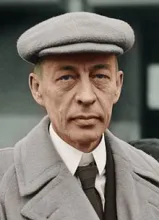Sergei Vasilyevich Rachmaninoff[a] (English: /rɑːxˈmɑːnəˌnɔːf, -ˌnɒf, rɑːk-/ rahkh-MAH-nə-nawf, -nof, rahk-;[3] Russian: Серге́й Васи́льевич Рахма́нинов[b], tr. Sergei Vasilyevich Rakhmaninov, IPA: [sʲɪrˈɡʲej vɐˈsʲilʲjɪvʲɪt͡ɕ rɐxˈmanʲɪnəf]; 1 April [O.S. 20 March] 1873 – 28 March 1943[c][d]) was a Russian composer, virtuoso pianist, and conductor of the late Romantic period. The influence of Tchaikovsky, Rimsky-Korsakov, Balakirev, Mussorgsky, and other Russian composers is seen in his early works, later giving way to a personal style notable for song-like melodicism, expressiveness and rich orchestral colors.
Born into a musical family, Rachmaninoff took up the piano at the age of four. He graduated from the Moscow Conservatory in 1892, having already composed several piano and orchestral pieces. In 1897, following the negative critical reaction to his Symphony No. 1, Rachmaninoff entered a four-year depression and composed little until successful therapy allowed him to complete his enthusiastically received Piano Concerto No. 2 in 1901. In the course of the next sixteen years, Rachmaninoff conducted at the Bolshoi Theatre, relocated to Dresden, Germany, and toured the United States for the first time. Rachmaninoff often featured the piano in his compositions, and he explored the expressive possibilities of the instrument through his own skills as a pianist.




